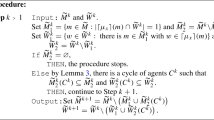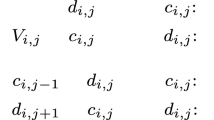Abstract
The stable marriage problem is a well-known problem of matching men to women so that no man and woman, who are not married to each other, both prefer each other. Such a problem has a wide variety of practical applications, ranging from matching resident doctors to hospitals, to matching students to schools or more generally to any two-sided market. In the classical stable marriage problem, both men and women express a strict preference order over the members of the other sex, in a qualitative way. Here we consider stable marriage problems with weighted preferences: each man (resp., woman) provides a score for each woman (resp., man). Such problems are more expressive than the classical stable marriage problems. Moreover, in some real-life situations it is more natural to express scores (to model, for example, profits or costs) rather than a qualitative preference ordering. In this context, we define new notions of stability and optimality, and we provide algorithms to find marriages which are stable and/or optimal according to these notions. While expressivity greatly increases by adopting weighted preferences, we show that in most cases the desired solutions can be found by adapting existing algorithms for the classical stable marriage problem. We also investigate manipulation issues in our framework. More precisely, we adapt the classical notion of manipulation to our context and we study if the procedures which return the new kinds of stable marriages are manipulable.
Access this chapter
Tax calculation will be finalised at checkout
Purchases are for personal use only
Preview
Unable to display preview. Download preview PDF.
Similar content being viewed by others
References
Arrow, K.J., Sen, A.K., Suzumura, K.: Handbook of Social Choice and Welfare. North Holland, Elsevier (2002)
Bistarelli, S., Foley, S., O’Sullivan, B., Santini, F.: From Marriages to Coalitions: A Soft CSP Approach. In: Oddi, A., Fages, F., Rossi, F. (eds.) CSCLP 2008. LNCS, vol. 5655, pp. 1–15. Springer, Heidelberg (2009)
Bistarelli, S., Montanari, U., Rossi, F.: Semiring-based constraint solving and optimization. Journal of the ACM 44(2), 201–236 (1997)
Gale, D., Shapley, L.S.: College admissions and the stability of marriage. Amer. Math. Monthly 69, 9–14 (1962)
Gale, D., Sotomayor, M.: Semiring-based constraint solving and optimization. American Mathematical Monthly 92, 261–268 (1985)
Gelain, M., Pini, M.S., Rossi, F., Venable, K.B., Walsh, T.: Male Optimal and Unique Stable Marriages with Partially Ordered Preferences. In: Guttmann, C., Dignum, F., Georgeff, M. (eds.) CARE 2009 / 2010. LNCS, vol. 6066, pp. 44–55. Springer, Heidelberg (2011)
Gelain, M., Pini, M.S., Rossi, F., Venable, K.B., Walsh, T.: Male optimality and uniqueness in stable marriage problems with partial orders - Extended abstract. In: AAMAS 2010 (2010)
Gusfield, D.: Three fast algorithms for four problems in stable marriage. SIAM J. Comput. 16(1), 111–128 (1987)
Gusfield, D., Irving, R.W.: The Stable Marriage Problem: Structure and Algorithms. MIT Press, Boston (1989)
Halldorsson, M., Irving, R.W., Iwama, K., Manlove, D., Miyazaki, S., Morita, Y., Scott, S.: Approximability results for stable marriage problems with ties. Theor. Comput. Sci. 306(1-3), 431–447 (2003)
Irving, R.W.: Stable marriage and indifference. Discrete Applied Mathematics 48, 261–272 (1994)
Irving, R.W., Leather, P., Gusfield, D.: An efficient algorithm for the “optimal” stable marriage. J. ACM 34(3), 532–543 (1987)
Liebowitz, J., Simien, J.: Computational efficiencies for multi-agents: a look at a multi-agent system for sailor assignment. Electonic government: an International Journal 2(4), 384–402 (2005)
Manlove, D.: The structure of stable marriage with indifference. Discrete Applied Mathematics 122(1-3), 167–181 (2002)
Pini, M.S., Rossi, F., Venable, K.B., Walsh, T.: Manipulation and gender neutrality in stable marriage procedures. In: Proc. AAMAS 2009, vol. 1, pp. 665–672 (2009)
Pini, M.S., Rossi, F., Venable, K.B., Walsh, T.: Stable marriage problems with quantitative preferences. In: Informal Proc. of COMSOC 2010 - Third International Workshop on Computational Social Choice (2010)
Pini, M.S., Rossi, F., Venable, K.B., Walsh, T.: Manipulation complexity and gender neutrality in stable marriage procedures. Journal of Autonomous Agents and Multi-Agent Systems 22(1), 183–199 (2011)
Roth, A.E.: The economics of matching: Stability and incentives. Mathematics of Operations Research 7, 617–628 (1982)
Roth, A.E.: The evolution of the labor market for medical interns and residents: a case study in game theory. Journal of Political Economy 92, 991–1016 (1984)
Roth, A.E.: Deferred acceptance algorithms: History, theory, practice, and open questions. International Journal of Game Theory, Special Issue in Honor of David Gale on his 85th birthday 36, 537–569 (2008)
Teo, C.-P., Sethuraman, J., Tan, W.-P.: Gale-shapley stable marriage problem revisited: Strategic issues and applications. Manage. Sci. 47(9), 1252–1267 (2001)
Author information
Authors and Affiliations
Editor information
Editors and Affiliations
Rights and permissions
Copyright information
© 2013 Springer-Verlag Berlin Heidelberg
About this paper
Cite this paper
Pini, M.S., Rossi, F., Venable, K.B., Walsh, T. (2013). Stability and Optimality in Matching Problems with Weighted Preferences. In: Filipe, J., Fred, A. (eds) Agents and Artificial Intelligence. ICAART 2011. Communications in Computer and Information Science, vol 271. Springer, Berlin, Heidelberg. https://doi.org/10.1007/978-3-642-29966-7_21
Download citation
DOI: https://doi.org/10.1007/978-3-642-29966-7_21
Publisher Name: Springer, Berlin, Heidelberg
Print ISBN: 978-3-642-29965-0
Online ISBN: 978-3-642-29966-7
eBook Packages: Computer ScienceComputer Science (R0)




